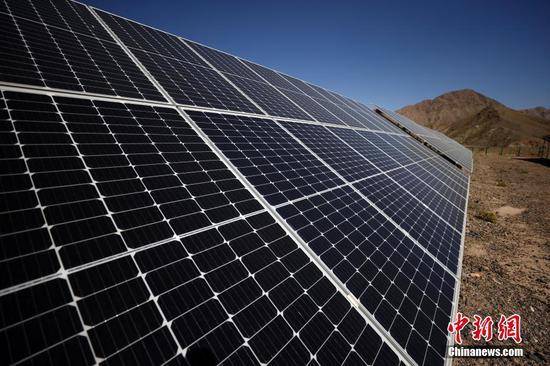
The photo taken on Sept. 25, 2021 shows a photovoltaic (PV) power station built to help alleviate poverty in Baykurut Village of Ulugqat Township, northwest China's Xinjiang Uygur Autonomous Region. (China News Service/Fu Tian)
(ECNS) -- China's national carbon market covers around 4.5 billion tons of carbon dioxide emissions, with more than 2000 power companies enlisted, said Zhai Qing, vice minister of Ecology and Environment, at the 2021 Asia-Pacific Forum on Green and Low-Carbon Development on Wednesday.
The market, which began online trading on July 16 this year, has become the world's largest in terms of the amount of greenhouse gas emissions covered, he said.
Zhai noted that China has achieved remarkable results in tackling climate change through a series of measures like adjusting industrial structures, optimizing energy mixes, improving energy efficiency, and promoting the construction of carbon markets.
In 2020, China's carbon dioxide emissions per unit of GDP was slashed by 48.4 percent compared to 2005, he added.
From 2016 to 2020, China cut 170 million tons of steel overcapacity and 1 billion tons of coal overcapacity, reducing the production of cement and plate glass by 300 million tons and 150 million weight cases, data from the Ministry of Ecology and Environment showed.
Statistics further revealed during the five years, the share of coal in total energy consumption dropped from 67 percent in 2005 to 56.8 percent in 2020, while the share of non-fossil fuels in the country’s primary energy consumption increased to 15.9 percent.
China has also constructively participated in and promoted the multilateral process on climate change by earnestly fulfilling its obligations under international environmental conventions, Zhai said.
China launched the International Coalition for Green Development along the Belt and Road in 2019, which now includes more than 150 institutions from 43 countries, he added.
In 2020, China announced that it aims to realize the goal of peaking carbon dioxide emissions by 2030 and achieving carbon neutrality by 2060.


















































 京公网安备 11010202009201号
京公网安备 11010202009201号